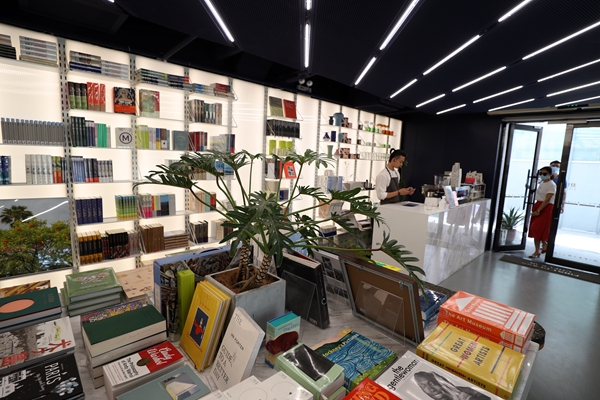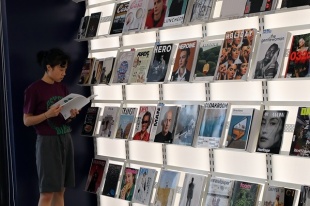Bookshop tells a story of hope


A place in a world of its own that welcomes and enthralls visitors, Yang Yang reports.
Like a symbol of a lost world, it seems almost out of place, even in the small space it occupies. A bookshop? In our modern digital, pandemic, temperature-checking world. A bookshop? In a time of downloads, WeChat. A bookshop? If not lost faith then surely a leap of faith.
The 40-square-meter bookshop, Jetlag Books, sits at a corner of Taikoo Li Sanlitun North, a modern shopping area in Beijing. It is so small that new visitors might miss it at first.
On an April day amid the COVID-19 pandemic, the normally busy streets of Sanlitun were eerily quiet as just a few people walked fast wearing masks and deliverymen whizzed to their destinations on their scooters. Two fashionable young women squeezed through fences and walked upstairs to a door, in front of which were a smooth steel table and chairs.
From the counter just inside the door, the women ordered themselves a cup of coffee each, picked two magazines and started reading. The smell of coffee soon filled the serene space, providing "a key, unique background for a bookstore".
One of the things that 30-year-old Lian Ziqiang, co-founder of the Jetlag Books, learned during the outbreak was that people in isolation realized that offline experiences cannot be replaced by online activities. "So for me, a physical bookshop is a good step to take," says Lian. A brave one as well, he might have added.
Lian, also known online as Wuyun Zhuangbanzhe, opened the bookshop on March 25. It is no secret to say that the sector is facing a challenging time.
"What the internet can't replace is what we need to develop," he says. "I wasn't 100 percent sure about it. I thought even if we couldn't sell products in store, we could continue the business online, but now that's not the case. The on-site experience is a very important thing and the pandemic has proved that."
Lian wants to provide people with the experience of a small and beautiful world in the bookstore, a community where people will feel free to talk to the staff members and each other about their shared interests, such as books, architecture and design.
For people who love design and magazines, the shelves on the left hand are a treat. Lian and his co-founder Cai Wei, an architect, carefully chose publications from all over the world-Popeye, Fantastic Man, and independent magazines from London, Berlin, Amsterdam and Melbourne.
There are more than 80 magazine titles, but due to the pandemic, many foreign magazines have not arrived, not to mention that some had to suspend publishing, Lian says. "Influential ones like Vogue used a photo of a rose as its cover for the combined issue of June and July because people cannot work."





































